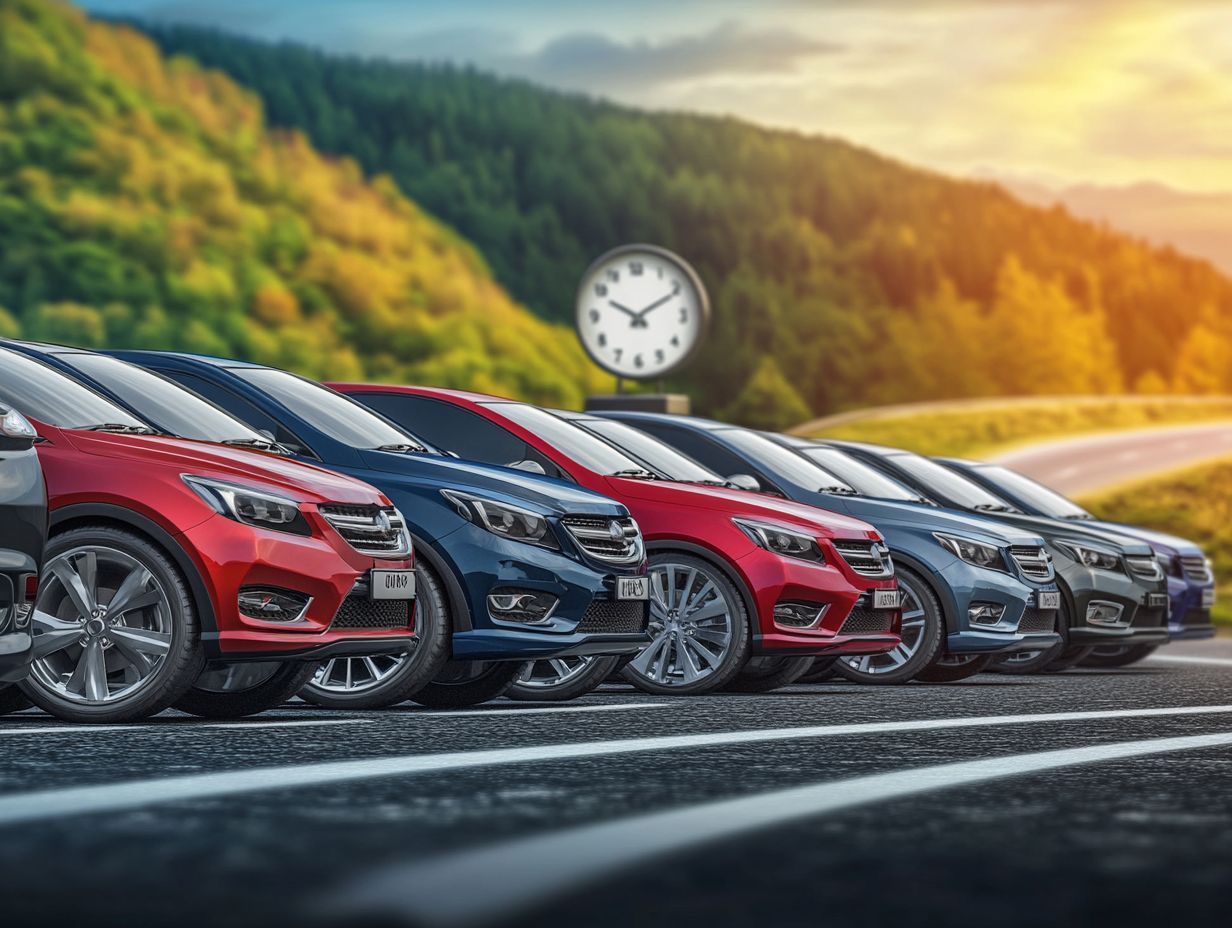User Ratings: Best Cars for Long Commutes
When tackling long commutes, selecting the right car can truly transform your experience. Comfort, fuel efficiency, and advanced technology are just a few of the essential features that can elevate your daily drive.
This article delves into the top-rated cars for long distances, drawing from user ratings to highlight key attributes such as safety, storage capacity, and overall value.
Whether you’re in the market for a dependable workhorse or a tech-savvy vehicle, you’ll discover valuable insights that can guide your decision-making process.
Contents
- Key Takeaways:
- 1. Comfort and Support
- 2. Fuel Efficiency
- 3. Audio and Navigation System
- 4. Safety Features
- 5. Storage Space
- 6. Performance and Handling
- 7. Interior Design and Quality
- 8. Technology Features
- 9. Reliability and Durability
- 10. Cost of Ownership
- 11. Maintenance and Repair Costs
- 12. Resale Value
- 13. Comfort for Passengers
- 14. Ease of Driving
- 15. Overall Value for Money
- What Makes a Car Ideal for Long Commutes?
- Frequently Asked Questions
- What Are User Ratings and Why Are They Important for Finding the Best Cars for Long Commutes?
- How Can I Find the Best Cars for Long Commutes Using User Ratings?
- What Factors Should I Consider When Looking at User Ratings for Cars?
- Can User Ratings Help Me Save Money on a Car?
- Are User Ratings for Cars Reliable and Trustworthy?
- How Often Should I Check User Ratings for My Car?
Key Takeaways:

- Comfort and support are crucial for long commutes, ensuring a comfortable and pain-free ride.
- Fuel efficiency is a must for long commutes, saving money and reducing environmental impact.
- Audio and navigation systems make long commutes more enjoyable and efficient, keeping drivers and passengers entertained and on track.
1. Comfort and Support
When it comes to your daily commute, comfort and support in your car are absolutely vital. The average American spends countless hours on the road. Vehicles like the Honda Civic, Nissan Sentra, and Toyota Corolla must provide an inviting driving experience.
You’ll want ergonomic seating and ample back seat space to enhance your commuting experience. Comfort features can vary significantly between different models, especially when you compare options like the Ford C-Max and Mazda3.
The C-Max offers supportive seating materials that cushion those long drives. With adjustable seats, you can easily find your ideal position for maximum comfort during your daily trips.
The Mazda3 offers sporty seating that looks great but might lack the depth of lumbar support found in the C-Max. A robust lumbar support system can transform a routine commute into a delightful journey, highlighting just how crucial thoughtful design is in commuter vehicles.
2. Fuel Efficiency
Fuel efficiency is a critical criterion for selecting the best commuter cars. The Honda CR-V, Toyota Venza, and Chevrolet Bolt EUV lead the way in gas savings, making them top choices for savvy commuters!
In today s economy, where every dollar matters, prioritizing vehicles that excel in fuel efficiency is key. The Honda CR-V, for instance, has an impressive fuel economy rating of up to 28 city and 34 highway MPG. It s no wonder this model is a favorite among those navigating daily traffic.
Similarly, the Toyota Venza stands out with around 40 MPG combined, making it a prime choice for hybrid enthusiasts. The Chevrolet Bolt EUV is an electric marvel that completely eliminates the need for gas, showcasing significant long-term savings.
These fuel-efficient models not only help you cut down on daily commuting expenses but also positively impact reducing carbon footprints, making them enticing options for environmentally conscious drivers.
An intuitive audio and navigation system significantly elevates your driving experience, much like the latest tech features found in the Tesla Model S and the Ford C-Max. These systems transform your daily commutes into enjoyable and efficient journeys.
By seamlessly integrating smartphone connectivity with user-friendly interfaces, you can effortlessly access music, navigation, and communication tools. The Honda Civic, in particular, shines with its responsive voice command features, ensuring you remain focused on the road while managing your playlists or getting directions.
This perfect blend of functionality and ease of use transforms every trip, allowing you to personalize your experience, stay connected, and navigate with confidence. Ultimately, this fosters a sense of safety and convenience as you travel.
In conclusion, choosing the right car for long commutes is essential for comfort, efficiency, and enjoyment on the road. Explore these options to transform your daily commute!
4. Safety Features
Safety features are essential in commuter cars. Models like the Honda Civic and Subaru Legacy truly excel, boasting high NHTSA safety ratings and expert reviews from KBB. This means you can feel secure during your daily drive.
These advanced systems significantly enhance overall vehicle safety. Features like automatic emergency braking help prevent collisions by detecting obstacles. Lane-keeping assist actively helps you stay centered in your lane, while adaptive cruise control adjusts your car’s speed to maintain a safe distance from the vehicle ahead.
When you compare various models, it becomes evident that vehicles equipped with these features consistently outperform their counterparts in safety ratings. Prioritize these technologies to experience unmatched peace of mind on your daily drive!
5. Storage Space
Ample storage space is an essential factor to consider in commuter cars, particularly in compact vehicles like the Ford C-Max and Honda CR-V. These models not only offer practical solutions for carrying your daily essentials but also ensure a comfortable back seat experience.
The significance of trunk capacity cannot be emphasized enough; it often dictates how smoothly you can transport groceries, sports gear, or luggage for that well-deserved weekend getaway. Thoughtful storage solutions within the cabin, including hidden compartments and adjustable shelving, further elevate the utility of these vehicles.
Take the Honda CR-V, for example, which excels with its spacious cargo hold and versatile Magic Seat feature. Meanwhile, the Ford C-Max stands out with its clever interior shelving and additional storage pockets. These comparisons show how practical and smartly designed these models are.
6. Performance and Handling
The performance and handling of commuter cars significantly shape your overall driving experience. Models like the Mazda3 and Honda Civic offer responsive steering and agility, making it effortless to navigate through urban traffic patterns.
These vehicles instill confidence as you drive. They feature advanced suspension systems and precision-engineered chassis that enhance their responsiveness. Take the Ford Focus, for instance; its sport-tuned suspension delivers sharp cornering and stability, making it perfect for both city driving and highway commutes.
Technology such as adaptive cruise control and lane-keeping assist can seamlessly complement your driving skills, ensuring a safer and more enjoyable journey. Ultimately, these desirable attributes elevate the daily grind of commuting and transform it into an engaging and pleasurable experience.
7. Interior Design and Quality

The interior design and quality of commuter cars are pivotal in crafting an enjoyable driving experience. Brands like Tesla set the standard for luxury with their Model S, showcasing modern aesthetics and high-quality materials that other vehicles, such as the Honda CR-V and Toyota Corolla, aspire to match.
Key elements such as dashboard layout, material quality, and thoughtfully selected color schemes don’t just enhance visual appeal; they also play a vital role in user comfort and functionality. For example, Tesla s minimalist dashboard design makes operation a breeze with its intuitive controls, while the Honda CR-V shines with its spacious interior and practical storage solutions.
On the other hand, the Toyota Corolla emphasizes a warm, inviting atmosphere through its carefully curated color palettes and soft-touch materials. This ensures that you feel relaxed during your daily commutes. By prioritizing these design elements, these vehicles create a sense of well-being and satisfaction, no matter where the road takes you.
What features matter most to you in a commuter car?
8. Technology Features
Modern technology features are essential in commuter cars. Top models like the Ford C-Max and Honda Civic integrate innovative driving aids that elevate your commuting experience.
These vehicles come equipped with advanced car entertainment systems, allowing you to connect your smartphone seamlessly. You can access apps, navigation, and music without taking your eyes off the road.
Many models also feature voice recognition technology, which enables you to control functions hands-free. This minimizes the need for physical interaction with your devices.
Driver assistance technologies, such as adaptive cruise control (which helps maintain a safe distance from other vehicles), lane-keeping assist, and automatic emergency braking, work together to provide a safety net that helps prevent accidents.
These enhancements not only make your commutes more enjoyable but also reduce stress on the road. Ultimately, they lead to a more efficient and secure driving journey.
9. Reliability and Durability
Reliability and durability are critical when selecting a commuter car. Models like the Honda Civic, Subaru Legacy, and Toyota Corolla stand out for their long-lasting performance and low maintenance needs.
These vehicles consistently earn high reliability ratings from various consumer reports. They showcase an impressive ability to endure daily wear and tear, providing peace of mind for drivers.
Owner feedback often emphasizes their strong resale value and minimal mechanical issues. It highlights the importance of these qualities for anyone who depends on a vehicle for everyday travel.
The low frequency of repairs linked to these models reinforces their reputation for durability. This allows you to concentrate on reaching your destinations without frequent interruptions.
In the end, the blend of dependability and affordable maintenance makes these cars exceptional choices for your daily grind.
10. Cost of Ownership
Understanding the cost of ownership for commuter cars is crucial. Factors like vehicle price, insurance rates, and potential leasing options can significantly influence your overall commuting expenses especially when you consider perks offered by companies like Edenred.
When analyzing the total cost of ownership, it s important to go beyond just the initial purchase price. Also, account for ongoing expenses related to fuel, maintenance, and insurance premiums.
These costs can vary widely across different car models, making thorough comparisons essential. For instance, hybrid vehicles might save you money on fuel, while certain brands could offer better coverage options at competitive rates.
Commuter programs often come with valuable incentives, such as tax benefits or reimbursements, which can significantly ease your financial burdens.
11. Maintenance and Repair Costs
Maintenance and repair costs are crucial when selecting a commuter car. Models like the Honda Civic and Toyota Prius receive accolades for their affordability and low upkeep, effectively lightening the financial load of your daily commute.
It s important to understand the typical expenses tied to various commuter vehicles. While some cars might come with a heftier upfront price tag, their long-term maintenance costs can be surprisingly manageable.
Common issues, like brake wear and tire replacements, can escalate if left unchecked. By scheduling regular check-ups and following manufacturer recommendations, you can avert costly repairs and prolong your vehicle’s lifespan.
Ultimately, making informed decisions about vehicle maintenance not only leads to significant savings over time but also ensures a smoother, more economical commuting experience.
12. Resale Value
Wondering how much your commuter car will be worth down the line? Resale value is key! The resale value of commuter cars is crucial when owning a vehicle. Popular models like the Honda Civic and Subaru Legacy tend to retain their value better than others, presenting a savvy financial choice for daily commuters.
To grasp this concept, it s vital to assess various factors that can influence your long-term return on investment. Brand reputation plays a significant role; vehicles from manufacturers renowned for their reliability often enjoy stronger resale values. Market demand can change based on economic conditions or trends in fuel efficiency, further impacting a car s worth.
The overall condition of the vehicle, including mileage, service history, and cosmetic aesthetics, also significantly contributes to its remaining value. By scrutinizing the resale performances of top models, you can make more informed decisions in your financial planning, ensuring that you choose vehicles that not only cater to your commuting needs but also hold their value over time.
13. Comfort for Passengers
Comfort is paramount when it comes to commuter cars. Models like the Honda CR-V and Mazda3 both offer spacious back seats and high-quality materials. This ensures a pleasant experience for everyone on those long drives.
You’ll appreciate the impressive legroom available, allowing taller passengers to stretch out without feeling cramped. The CR-V stands out with its innovative seat configuration and versatile cargo space, easily adapting to your various needs. Meanwhile, the Mazda3 impresses with its refined interior and stylish design, giving it a distinctly upscale feel.
Don t overlook the climate control settings either. The CR-V features a dual-zone climate system, so everyone can enjoy their preferred temperature. The Mazda3 provides efficient ventilation that keeps the cabin atmosphere just right.
When you compare them side by side, it s clear that both models are thoughtfully engineered with passenger comfort in mind, ensuring every road trip is enjoyable.
14. Ease of Driving

The ease of driving is crucial when choosing a commuter car. Take the Tesla Model S and Ford C-Max, for example. They come equipped with new technologies that help you drive better, making your daily commute not just manageable, but genuinely stress-free.
These technologies think adaptive cruise control, lane-keeping assist, and automatic emergency braking not only enhance safety but also lighten the mental load of those long drives. You ll find that these features allow you to maintain focus on the road while the vehicle handles certain driving tasks, which is especially valuable during frustrating traffic jams.
Consider the Tesla Model S with its impressive Autopilot system, offering semi-autonomous capabilities. On the other hand, the Ford C-Max’s Intelligent Braking system artfully blends comfort with efficiency. Both vehicles showcase how they uniquely cater to the needs of today s discerning drivers.
15. Overall Value for Money
Overall value for money is a critical factor when you’re considering commuter cars. Models like the Honda Civic and Toyota Corolla strike an impressive balance with competitive pricing, outstanding fuel economy, and proven reliability perfect for those mindful of their budget.
As you evaluate these vehicles, it s essential to look beyond just the purchase price. Factors such as fuel efficiency and safety ratings can significantly affect your long-term expenses. Additionally, a car’s resale value is pivotal in assessing overall worth; models that hold their value well can lead to substantial savings over time.
In this crowded marketplace, vehicles that offer an excellent distance per gallon coupled with top-notch safety scores, like the Subaru Impreza and Hyundai Elantra, emerge as intelligent choices for commuters who desire both quality and affordability.
Don’t miss out on the best deals; act fast!
What Makes a Car Ideal for Long Commutes?
The ideal car for your long commutes seamlessly blends essential elements like exceptional fuel economy and comfort. It also includes modern driving tools and reliability, all critical for ensuring a smooth and enjoyable daily journey.
This type of vehicle prioritizes spacious interiors and ergonomic seating arrangements. These features allow you to stretch out and truly relax during those extended trips. Modern infotainment systems and connectivity options keep you engaged and entertained, transforming the monotony of long drives into an enjoyable experience.
Safety features such as lane departure warnings and adaptive cruise control enhance your comfort and provide peace of mind on the road.
Together, these characteristics shape a commuter car that meets your practical travel needs while elevating your overall driving experience.
What Are the Top-Rated Cars for Long Commutes According to User Ratings?
According to user ratings, the top-rated cars for long commutes include the Honda Civic, Toyota Corolla, and Ford C-Max. These models excel in comfort, fuel efficiency, and overall performance, making them must-have choices for daily commuters.
Drivers rave about these vehicles not just for their impressive fuel economy, but also for their spacious interiors, which offer generous legroom and headspace. These are essential features for those long hours on the road.
Features like improved sound insulation and advanced infotainment systems elevate the driving experience, ensuring you enjoy both comfort and entertainment during your journey.
Commuters particularly value the reliability and low maintenance costs of these vehicles, highlighting their significance as long-term investments for anyone navigating the daily grind. This seamless blend of attributes fosters a stress-free driving experience that resonates deeply with user feedback.
What Are the Common Features of These Top-Rated Cars?
Common features among the top-rated cars for college students include exceptional comfort, impressive fuel economy, and robust safety features. All are designed to meet your needs during those daily journeys.
These attributes not only elevate your driving experience but also help ease the potential stress of spending long hours on the road. The best commuter cars offer spacious interiors that prioritize ergonomics, ensuring that you and your passengers can travel in absolute comfort.
Advanced technological integrations, such as intuitive infotainment systems and seamless smartphone connectivity, enhance convenience. They put navigation and entertainment right at your fingertips. With top-tier safety features like adaptive cruise control and lane-keeping assist, feel the confidence as you drive.
How Do These Cars Compare to Others in the Same Category?
When you compare these top-rated cars to others in the same commuter category, models like the Honda Civic and Toyota Corolla consistently outshine alternatives such as the Nissan Sentra in reliability, fuel efficiency, and overall value.
This advantage really comes to life when you evaluate driving dynamics. The Civic stands out with its spirited handling and robust engine options, making your daily drives significantly more engaging. While the Corolla offers an impressively smooth ride, it can sometimes lack that extra thrill in acceleration.
Both the Civic and Corolla provide spacious cabins adorned with high-quality materials. In contrast, competitors like the Sentra tend to fall short with less ergonomic seating and dated technology. You’ll likely appreciate the perfect blend of performance and comfort that these leading models offer, ultimately enhancing your driving experience.
Ready to find your perfect commuting companion? Consider a test drive or research these models further!
What Are the Potential Drawbacks of These Cars for Long Commutes?
Despite their numerous accolades, consider the drawbacks these cars present for long commutes. Factors like limited back seat space, a lack of advanced driver assistance features, and lower fuel economy can significantly impact your overall commuting experience.
These shortcomings stand out during longer journeys where comfort becomes essential. A cramped back seat can lead to discomfort over time, making these vehicles less ideal for families or anyone who frequently transports passengers.
The absence of cutting-edge technology, such as a system that maintains a set speed and distance from the car in front or advanced infotainment systems, can leave you feeling disconnected or frustrated during extended travels. Some top-rated options have good fuel efficiency; however, as fuel efficiency drops, you’ll face higher costs on longer trips, ultimately diminishing the appeal of these vehicles for those who often drive long distances.
Frequently Asked Questions

What Are User Ratings and Why Are They Important for Finding the Best Cars for Long Commutes?
User ratings are feedback given by individuals who have experience with a particular car. They are important because they provide insight into the real-life performance and reliability of a car, helping others make informed decisions about their potential purchase.
How Can I Find the Best Cars for Long Commutes Using User Ratings?
You can find the best cars for long commutes using user ratings by researching and comparing the ratings and reviews of different cars online. For instance, check out user ratings for weekend getaways to get insights. You can also ask for recommendations from friends, family, or online communities that have experience with long commutes.
What Factors Should I Consider When Looking at User Ratings for Cars?
When looking at user ratings for cars, pay attention to factors such as comfort, fuel efficiency, reliability, and overall performance. These are all key aspects to consider for a car that will be used for long drives.
Can User Ratings Help Me Save Money on a Car?
Yes, user ratings can be valuable for saving money on a car. By reading reviews and ratings, you can avoid purchasing a car with potential issues or poor performance, ultimately saving you from expensive repairs or a costly purchase.
Are User Ratings for Cars Reliable and Trustworthy?
While individual experiences may vary, user ratings for cars are generally reliable and trustworthy. They are based on real experiences and can provide valuable insights into the overall performance and satisfaction of a car for long trips.
How Often Should I Check User Ratings for My Car?
Check user ratings for your car periodically, especially if you notice changes in its performance or if you are considering purchasing a new car. This will help you stay informed and make the best choice for your commuting needs.
Ready to find your perfect commuting companion? Start exploring user reviews today!






